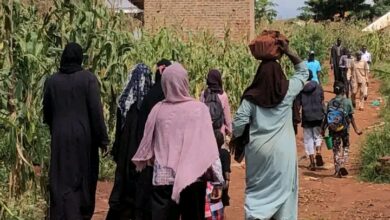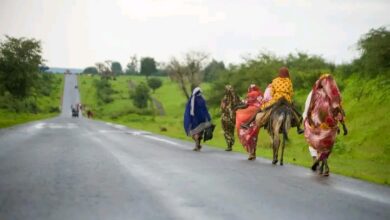Displaced from South and West Kordofan: A Crisis of Tragedy, Disease, and Hunger
Sudanese Media Forum

By: Siddiq Al-Dukhri
Al-Obeid, July 16, 2025 – Mashawir Platform
In their harrowing journey of displacement, residents of South and West Kordofan endured three to four nights on foot before reaching their new destinations, with many stranded along the way. Women bore the brunt of the suffering.
Since the outbreak of fighting between the Sudanese Armed Forces and the Rapid Support Forces (RSF), South Kordofan has been a key battleground, displacing thousands in repeated waves.
For displaced women, lack of vitamins, malnutrition, and the absence of essential vaccinations during pregnancy have contributed to a sharp rise in miscarriages. Dozens of mothers lost consciousness while fleeing, and some died from bleeding in search of medical care.
A Catastrophic Situation
Safia Al-Obeid, a resident of Al-Nuhud, told Mashawir that conditions worsened dramatically after the RSF took control of the city, leading to the collapse of the healthcare system due to looting and the flight of medical staff.
“A month later, the health situation became catastrophic,” she said. “Most hospitals ceased operations due to the lack of medical supplies and medicine. There is no way to save the lives of women—especially pregnant women, and patients with kidney failure or diabetes—as ambulances and safe passages are unavailable.”
She added that the shortage of medicines, equipment, and medical staff led to an increase in pregnancy complications such as hypertension, high blood sugar, and strokes.
“Hundreds of displaced women are suffering severely,” she said, noting multiple deaths due to malnutrition, poisoning, dengue fever, typhoid, and childbirth complications.
Suffering and Crises
Nawal Al-Naeem, who fled with her family from Al-Fula in West Kordofan, described a grueling journey involving carts and trucks to reach Abu Haraz, and finally Al-Obeid, the capital of North Kordofan.
She reported that many women in nearby villages suffer from chronic illnesses, and “we often hear women crying, but we’re powerless to help their families—an incredibly painful reality.”
Breastfeeding mothers are among the most affected. Several experienced severe distress before reaching medical facilities. Five women miscarried en route from Al-Fula due to lack of medical care.
Facing Death
A citizen, identified as (A.K.), recounted taking his pregnant wife by private car from Al-Ahmar near Dilling, heading toward Abu Zabad, when they were stopped by RSF soldiers at a checkpoint near Oulad Younis village. The soldiers seized their vehicle, but upon realizing the woman was ill, they replaced it with a three-wheeled tuk-tuk at their own cost to allow the couple to continue.
“She was in excruciating pain,” he said. After reaching Abu Zabad, doctors performed a miscarriage procedure and blood transfusion.
He added that many women and girls trapped in conflict zones are unable to flee and face death due to the deteriorating health situation and medicine shortages.
Fear and Panic
Wisal Mohamed Al-Sharif, displaced from Dilling, said:
“After the RSF recaptured the area from the army and violations increased, we feared being killed, raped, or subjected to sexual violence. So we fled to Al-Obeid.”
“With no transportation, I walked for four hours before a car finally picked me up. The road was packed with thousands fleeing the war.”
At the hospital, after waiting for hours, she was told there was no fetal heartbeat and that she needed an urgent abortion to stop internal bleeding.
“I underwent the procedure and was the sixth miscarriage case that day. The doctor said the miscarriage resulted from exhaustion and fear during the journey.”
Contributing Factors
Obstetrician Dr. Mubarak Al-Zubair said the war has intensified the suffering of women in Kordofan due to violations and the lack of healthcare.
He noted a significant increase in miscarriages caused by fear, panic from aerial and artillery bombardment, psychological trauma, repeated displacement, and malnutrition.
He explained that the shortage of medications, vitamins, and nutritional supplements essential for the first trimester, along with missing vaccinations, have contributed to repeated miscarriages.
“Displacement forces women to walk or run for long distances carrying belongings,” he said. This, he noted, causes bleeding, high blood pressure, and even placental abruption, ultimately leading to miscarriage.
This report, prepared by Mashawir Platform, is published by the Sudanese Media Forum and its member institutions to highlight the extreme suffering faced by pregnant women and mothers in South and North Kordofan. Doctors warn of a surge in miscarriages among displaced women, calling for urgent intervention.




